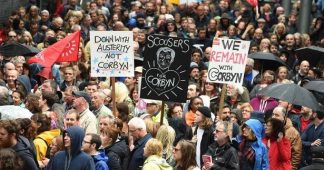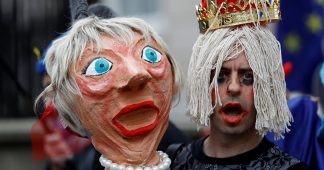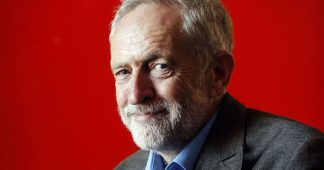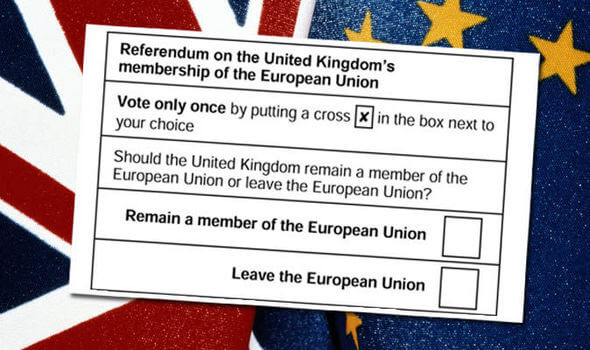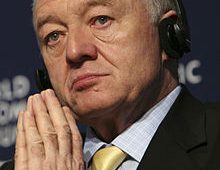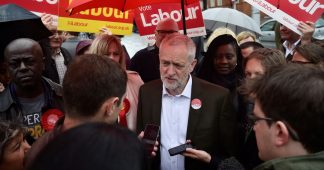An eco-socialist and international coordinator for the Greens Party of England and Wales, Derek Wall is challenging Conservative Prime Minister Theresa May as the Greens candidate for May’s seat of Maidenhead under the slogan “Make June the End of May”.
Campaigning against racist migration controls, austerity and May’s support for fox hunting is giving Wall’s campaign traction, and it enjoys strong support from the Kurdish community.
Below, Wall provides an overview of the elections and the campaign by progressive, anti-austerity forces to unseat May’s Tories. It was written before the Manchester terror attack, after which campaigning was temporarily suspended.
The impact of the atrocity on the elections remains unclear. May has responded with greater militarisation, with armed soldiers on the streets. Labour’s socialist leader Jeremy Corbyn, a veteran anti-war campaigner, has responded by pointing to the role of Western wars and interventions in creating conditions that fuel terrorism.
***
Britain goes to the polls on June 8 after Theresa May called an unexpected snap general election, hoping to take advantage of a large polling lead over the Jeremy Corbyn-led Labour Party.
But despite strong polls, the Conservatives are in crisis. May is enjoying a honeymoon period having replaced previous leader David Cameron in the aftermath of Brexit referendum last June. However the issue of the European Union exit continues to divide her party.
Britain has faced a crisis of identity since the 1950s with loss of its empire, leading to an increasingly ambiguous relationship with the rest of Europe. In turn, the unity of the nations that make up the British state has been severely challenged.
Since Margaret Thatcher was deposed by her Conservative Party in 1990, the party has remained divided between pro and anti-European Union wings. David Cameron called a referendum on Britain’s EU membership as a way of dealing with the conflict, wrongly expecting voters to support continued membership.
However, Britain voted to leave and Cameron resigned. There have long been left-wing criticisms of the EU, however the campaign to leave the EU drew upon racist, anti-migrant and refugee sentiments. In a bitter atmosphere, pro-remain Labour Party MP Jo Cox was murdered by a neo-Nazi.
Britain has been divided by the EU vote. Predominantly older voters in England supported leaving, while young voters and voters in Northern Ireland and Scotland voted to remain. Exiting from the EU, via a process still being negotiated, is likely to have major economic and political costs.
The British establishment, divided as it is on Europe, is obsessed with Corbyn, a long standing socialist, sympathetic to eco-socialist perspectives. Despite universal establishment hostility, including most Labour MPs, Corbyn now won two landslide victories as Labour leader. This has appalled the Labour machine, the British media and those with wealth and power.
The “get Corbyn” campaign, including the open rebellion from his MPs and 24/7 media attacks, has dragged Labour down in the polls. May hopes to take advantage to boost her slender majority with a landslide Tory w. Her goal is to reshape Britain in a sharply right wing direction with an emphasis on xenophobia.
As I write, Labour is climbing in the polls with a left manifesto drawing support especially from young voters. Even if Labour loses badly, Corbyn will seek to remain leader — at least until the introduction of new rules that will allow a left wing successor to stand. At present any leadership candidate needs the support of 15% of Labour MPs. This restriction could block a left candidate from standing, even when they strong support among members.
Rather than taking votes from Labour, May is high in the polls mostly due to the collapse of the right-wing UK Independence Party . UKIP has had the ground stolen from under it by the Conservatives hard right turn, capturing UKIP’s base.
The left outside Labour are largely supporting Corbyn. For the first time since its formation, the Communist Party of Britain is not running candidates. Neither is the Trade Union and Socialist Coalition, led by the Socialist Party, or Left Unity.
For our part, the Green Party of England and Wales have sought a “progressive alliance” with Corbyn’s Labour and other left groups, based on standing in some marginal constituencies with an eye to not undermining Labour’s chances. However, Labour has not reciprocated. For instance, Labour is standing against the Greens sole MP, Caroline Lucas, in Brighton Pavillion.
The Greens will work with Corbyn or a future left leader, but are aware that the Labour right, which controls party structures, may defeat the left. The Greens are campaigning strongly against nuclear weapons, nuclear power and for an internationalist pro-European perspective.
In Scotland, the Scottish National Party (SNP) won 56 of 59 MPs in the 2015 General Election. Labour under a right wing leader lost 40 seats. Scottish politics has been transformed, a left party RISE is active in promoting a broadly eco-socialist perspective.
The Scottish Green Party, long independent from its English and Welsh counterparts, is contesting just three seats. This is partly because in a system without proportional representation, they are keener to contest local and Scottish parliamentary where a fairer, proportional voting system means they can win seats. Equally, the Scottish Greens are keen not to split the pro-independence vote, so as to prevent the unionist Conservation Party taking parliamentary seats from the SNP.
In Northern Ireland, the Greens are a regional party of the Irish Greens. They have recently picked up Assembly seats and are contesting seven Parliamentary constituencies on June 8. A pro-European Union progressive alliance with republican party Sinn Fein and the Social Democratic and Labour Party did not come to fruition.
Sinn Fein has won a rising share of the vote in Ireland’s north and in recent Assembly elections, fell just short of the vote of the dominant right-wing Democratic Unionist Party. In the Assembly elections, the unionist (pro-British) vote fell overall, with unionists losing a majority of the Assembly for the first time ever.
With the previously hegemonic unionist parties in decline, both Sinn Fein and the Greens are campaigning on LGBTQI issues, women’s rights and defence of the Gaelic language.
If Corbyn pulls off what seems impossible, a trick in which he seems to specialise, and actually wins, then Britain will head left. However, even a defeat for Labour could still lay the basis for the left to strengthen. The economic and political contradictions of Brexit will make May’s position challenging, on top of her government’s extreme austerity measures. Despite contradictions, in the recent period the varied British left has moved in a more radical and less sectarian direction.
